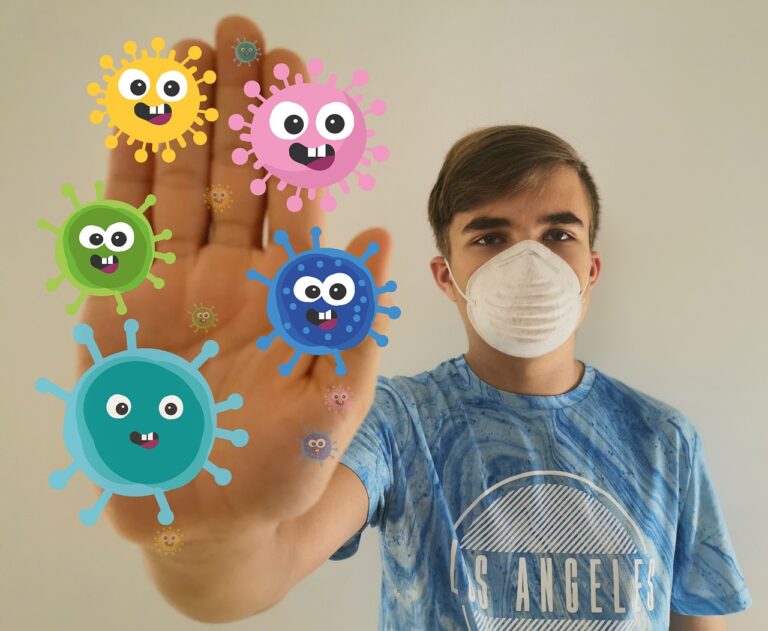Exploring the Benefits of Animal-Assisted Therapy in Healthcare Settings
Animal-assisted therapy has gained significant traction in recent years as a complementary approach to traditional forms of treatment. With mounting evidence of its effectiveness in improving mental and physical well-being, the appeal of incorporating animals into therapy sessions continues to grow. The unique bond between humans and animals has proven to be a powerful therapeutic tool, transcending language barriers and cultural differences.
The rise in the popularity of animal-assisted therapy can be attributed to its ability to provide a sense of comfort and emotional support to individuals in need. Research has shown that interaction with animals can help reduce feelings of stress and anxiety, offering a calming presence that promotes relaxation. As more people seek holistic approaches to healing, the role of animals in therapy is being increasingly recognized for its potential to enhance overall well-being and foster positive outcomes in treatment.
The Positive Impact on Mental Health
Animal-assisted therapy has been gaining recognition for its positive effects on mental health. Interactions with animals, such as petting a dog or watching fish swim, can help reduce feelings of loneliness and improve mood. These meaningful connections with animals provide a sense of companionship and comfort, which can alleviate symptoms of anxiety, depression, and other mental health conditions.
Furthermore, engaging in activities with animals can boost self-esteem and self-confidence. Taking care of a pet, for example, can instill a sense of responsibility and purpose, leading to a greater sense of well-being. The unconditional love and nonjudgmental nature of animals create a safe and nurturing environment that fosters emotional healing and resilience.
Physical Health Benefits
Animal-assisted therapy has shown remarkable physical health benefits for individuals of all ages. One primary advantage is the increase in physical activity levels observed in those engaging with therapy animals. Whether through walking a dog or interacting with a horse, these interactions encourage movement and exercise, contributing to improved cardiovascular health and overall fitness. Additionally, studies have illustrated that the presence of therapy animals can lead to reduced blood pressure and heart rate in individuals, promoting better heart health and stress reduction.
Moreover, animal-assisted therapy has been linked to enhanced motor skills development in both children and adults. Through activities like grooming, feeding, or playing with animals, individuals can improve their fine and gross motor skills. This can be particularly beneficial for individuals undergoing physical rehabilitation or those with conditions affecting their motor functions. The tactile interactions with animals can help improve coordination, dexterity, and muscle strength, ultimately supporting physical recovery and well-being.
Emotional Support and Comfort
Providing a source of unconditional love and comfort, animals play a crucial role in offering emotional support to individuals facing mental health challenges. Their presence can bring a sense of calmness and security, helping to alleviate feelings of loneliness and isolation. For many people, the simple act of petting a dog or cuddling a cat can provide immense emotional solace and reassurance during difficult times.
Through their innate ability to empathize and offer companionship, animals have the power to soothe anxieties and offer a sense of emotional stability. Whether it’s a wagging tail, a purring sound, or a gentle nuzzle, the presence of animals can significantly boost mood and provide a source of comfort that transcends verbal communication. For individuals struggling with emotional distress or trauma, the non-judgmental and affectionate nature of animals can create a safe and nurturing environment for healing and emotional support.
Reducing Stress and Anxiety Levels
Animal-assisted therapy has been increasingly recognized for its efficacy in reducing stress and anxiety levels among individuals of all ages. Interacting with animals, such as therapy dogs or horses, has shown to have a calming effect on the mind and body. The unconditional love and non-judgmental nature of animals create a safe and soothing environment, allowing individuals to relax and unwind from the pressures of daily life.
Studies have indicated that spending time with animals can lower cortisol levels, which are often elevated during periods of stress. Additionally, the simple act of petting an animal can release oxytocin, a hormone that promotes feelings of bonding and reduces anxiety. Whether through playful interactions or simply being in the presence of an animal, the therapeutic benefits of animal-assisted interventions in alleviating stress and anxiety are undeniable.
Improving Communication and Social Skills
Research has shown that animal-assisted therapy can have a positive impact on improving communication and social skills in individuals. Interacting with animals can help to break down barriers and foster connections between people, leading to enhanced communication abilities and improved social interactions. Animals can provide a non-judgmental and comforting presence that can help individuals feel more at ease and open to engaging with others.
Moreover, the unconditional love and acceptance that animals provide can help individuals build trust and establish relationships with others. This can be particularly beneficial for individuals who struggle with communication and social skills, as animals can serve as a bridge to connecting with others in a meaningful way. By engaging in activities with animals, individuals can learn valuable interpersonal skills that can be transferred to interactions with people, ultimately improving their communication and social skills.
Enhancing Overall Well-Being
Animal-assisted therapy has shown remarkable potential in enhancing overall well-being among individuals of all ages. Through interactions with therapy animals, people often experience a sense of joy, companionship, and emotional connection that can significantly improve their mental and emotional health. These positive interactions with animals have been found to uplift mood, reduce feelings of loneliness, and increase overall feelings of happiness and contentment.
Moreover, engaging with therapy animals can also promote physical well-being by encouraging individuals to be more active and engage in physical activities. Whether it’s through playing with a dog, grooming a horse, or simply taking a walk with a therapy animal, these interactions can help boost physical fitness levels and overall health. The bond formed with therapy animals can serve as a source of motivation for individuals to stay active and maintain a healthy lifestyle, contributing to their overall well-being.
Boosting Motivation and Engagement
Animal-assisted therapy has been shown to significantly boost motivation and engagement in individuals undergoing treatment. The presence of animals can ignite a sense of purpose and drive, encouraging patients to actively participate in therapy sessions and rehabilitation programs. The unconditional love and companionship provided by therapy animals create a positive and supportive environment that inspires individuals to push themselves beyond their limits.
Moreover, the bond formed between humans and animals during therapy sessions fosters a sense of connection and belonging, enhancing motivation and engagement in the healing process. Animals have a unique ability to uplift spirits and instill a sense of joy and enthusiasm in patients, motivating them to actively engage in therapeutic activities and work towards their recovery goals. The presence of animals not only improves the overall experience of therapy but also serves as a powerful motivator for individuals to stay committed to their treatment journey.
Promoting Relaxation and Decreasing Pain
Animal-assisted therapy has shown promising results in promoting relaxation and decreasing pain among individuals struggling with various physical and emotional ailments. The calming presence of therapy animals has a remarkable ability to soothe anxieties, lower stress levels, and create a sense of tranquility in those undergoing treatment. Through gentle interactions with animals, patients often experience a reduction in pain perception and an overall increase in relaxation, leading to a more positive healing experience.
The powerful bond formed between humans and therapy animals plays a significant role in promoting relaxation and alleviating pain. Studies have demonstrated that spending time with animals can trigger the release of endorphins, the body’s natural painkillers, which contribute to a sense of well-being and comfort. Moreover, the non-judgmental companionship offered by therapy animals fosters a safe and supportive environment for individuals to unwind, destress, and find relief from physical discomfort, ultimately enhancing their overall quality of life.
The Role of Animals in Healing Processes
Animals play a significant role in the healing processes of individuals across various settings. They have the innate ability to provide a sense of comfort, companionship, and unconditional love that can be immensely therapeutic for those going through challenging times. Research has shown that interactions with animals can help reduce feelings of loneliness, anxiety, and depression, ultimately contributing to improved mental and emotional well-being.
Moreover, the presence of animals has been linked to physical health benefits, such as decreased blood pressure, lowered heart rate, and reduced levels of cortisol – the stress hormone. Engaging with animals in activities like petting, grooming, or simply being in their company can trigger the release of endorphins, the body’s natural mood elevators, leading to an overall sense of relaxation and contentment. In healthcare settings, animal-assisted therapy has proven to be a valuable adjunct to traditional treatments, offering patients a unique form of support that aids in their recovery journey.
What is animal-assisted therapy?
Animal-assisted therapy involves using animals as a form of treatment to improve a person’s physical, social, emotional, or cognitive functioning.
How can animals positively impact mental health?
Animals can provide emotional support, reduce stress and anxiety levels, and promote relaxation, which can all contribute to improved mental health.
What are some physical health benefits of interacting with animals?
Interacting with animals can lead to lower blood pressure, reduced heart rate, and improved physical fitness through activities like walking or playing with a pet.
How do animals provide emotional support and comfort?
Animals offer unconditional love and companionship, which can help individuals feel less alone and more connected.
Can animals help improve communication and social skills?
Yes, interacting with animals can help individuals practice communication skills, empathy, and social interactions in a non-judgmental environment.
How do animals enhance overall well-being?
Animals can boost mood, increase feelings of happiness and fulfillment, and provide a sense of purpose and companionship.
In what ways can animals boost motivation and engagement?
Animals can motivate individuals to be more active, engage in activities, and maintain a routine that contributes to their overall well-being.
How do animals promote relaxation and decrease pain?
Animals have a calming effect on individuals, which can reduce feelings of stress and anxiety and help alleviate pain through distraction and comfort.







